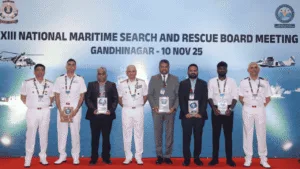NATIONAL MARITIME SEARCH AND RESCUE (NMSAR) BOARD MEETING
National Maritime Search and Rescue (NMSAR): Brave Efforts to Protect Ocean Lives
On November 10, 2025, the Indian Coast Guard hosted the 23rd National Maritime Search and Rescue (NMSAR) Board meeting in Gandhinagar. This important event highlighted the Coast Guard’s crucial role as the nodal agency coordinating Maritime and Aeronautical Search and Rescue within the Indian Search and Rescue Region (ISRR). Given India’s vast coastline and growing maritime activity, the ICG’s primary duty is to safeguard the safety of lives at sea by efficiently coordinating and monitoring search and rescue (SAR) operations. This meeting emphasises the shared commitment to protecting lives in Indian seas and acts as the highest decision-making body for all issues pertaining to marine SAR operations in India.
The meeting was presided over by Director General S Paramesh, AVSM, PTM, TM, the Chairperson of the National Maritime Search and Rescue Board and Director General of the Indian Coast Guard. He emphasised the significance of effective SAR operations as a fundamental component of India’s infrastructure for marine safety. Recognising that lives saved at sea directly reflect the efficacy of coordinated rescue efforts, the leadership emphasises the necessity for ongoing improvement and shared commitment among diverse stakeholders to sustain and strengthen maritime safety standards. The
The National SAR awards for 2023–2024, which honour exceptional achievements to maritime safety, were given out during the meeting.

The awards are a significant acknowledgement of excellence and dedication in a number of categories: the Indian Coast Guard ship Rajveer won in the government-owned SAR unit category; the merchant ship MV He Yuan Shun 89, flying the Panamanian flag, was honoured; the Indian fishing boat Kedarnath Bhole was recognised for its efforts; and the Mumbai Port Authority’s Vessel Traffic System (VTS), in collaboration with Jawaharlal Nehru Port Authority, were recognised in the ashore unit category. These honours recognise creative and practical contributions to the safety of marine operations and showcase the cooperative efforts of diverse maritime stakeholders.
The 23rd National Maritime Search and Rescue Board meeting’s main goal was to improve stakeholder cooperation and interagency coordination, which is crucial to improving India’s overall SAR framework.
The Indian Coast Guard is still committed to incorporating state-of-the-art technology and contemporary communication methods into SAR missions. Improved maritime safety standards and quick response times are guaranteed by effective cooperation between the Indian Navy, Indian Air Force, ISRO, INCOIS, Airports Authority of India, Directorate General of Shipping, and other organisations. The exchange of information, resources, and operational know-how is made easier by such integration and coordination, which is essential for prompt and effective rescues. The
The Indian Coast Guard has carried out an astounding 4,203 SAR missions since its founding, successfully saving over 11,805 lives and carrying out 495 medical evacuations at sea. This astounding figure shows that, on average, one life is saved every other day.
119 missions were completed in the past year alone, saving 108 lives and performing 14 medical evacuations. These figures demonstrate the humanitarian mission of ICG and the unwavering efforts of its staff to provide safety and rescue in one of the most difficult environments. In addition to saving lives, this persistent dedication upholds India’s standing as a responsible maritime nation. The
A wide range of important aviation and maritime players attended the meeting. The Indian Navy, Air Force, ISRO, Indian National Centre for Ocean Information Services (INCOIS), Airports Authority of India, and Directorate General of Shipping are all part of this collaboration. The meeting’s interactive sessions and lectures encouraged the sharing of information, best practices, and creative concepts for enhancing SAR operations.
As an illustration of the vital role that technology plays in contemporary marine safety, INCOIS recently won accolades for developing search and rescue systems that make use of cutting-edge ocean research and technology. These agencies’ cooperation guarantees that India is always alert and ready for marine crises, constantly enhancing rescue operations through pooled knowledge. The
The ICG is in charge of the Indian Search and Rescue Region (ISRR), which is a defined territory that includes large marine zones where emergency response coordination and maritime safety are required. The Maritime Rescue Coordination Centres (MRCCs) in Mumbai, Chennai, and Port Blair oversee the sub-regions that make up the ISRR. In order to efficiently respond to distress warnings, these centres use real-time satellite data and communication technology, operating around the clock.
By ensuring that rescue operations are prompt, well-planned, and resource-efficient, the ISRR and its operational processes lower the risk to people and property at sea.
All things considered, during the National Maritime Search and Rescue Board Meeting about India’s ongoing dedication to marine safety and rescue operations was demonstrated during the 23rd National Marine Search and Rescue Board meeting. The Indian Coast Guard and its partners are enhancing the resilience and dependability of India’s marine SAR system by strengthening inter-agency cooperation, honouring exceptional work with prizes, and concentrating on incorporating new technologies. In an area with one of the busiest sea routes in the world, where maritime safety guarantees not only the preservation of human lives but also the security and prosperity of the country, this coordinated effort is essential.